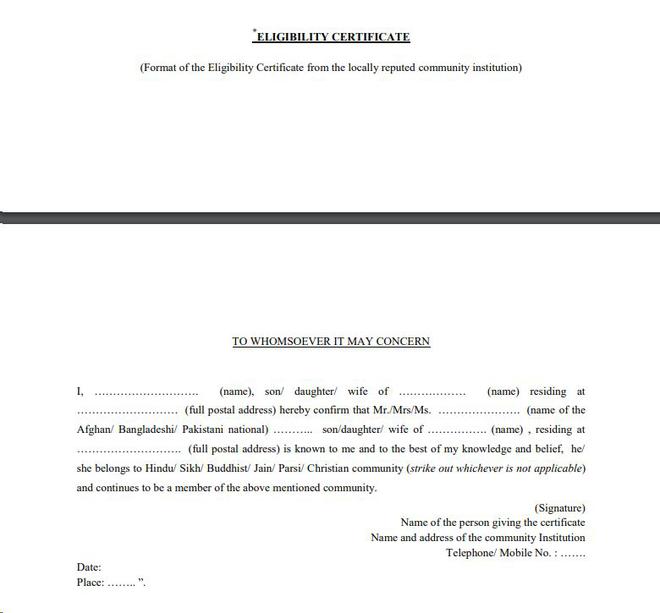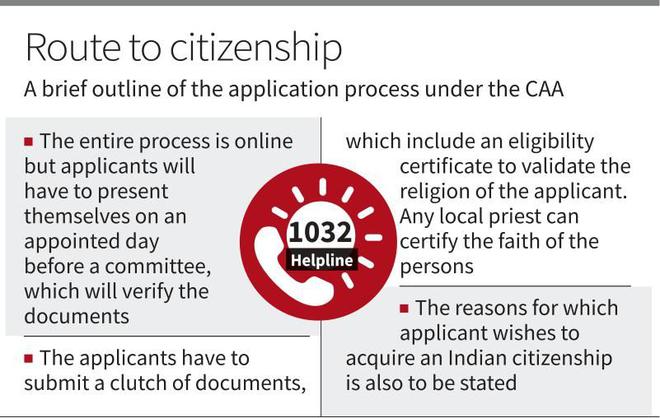A local priest may issue an “eligibility certificate” under the Citizenship (Amendment) Act (CAA), 2019 to validate the religion of an applicant, according to a response received by The Hindu through the Union Ministry of Home Affairs’ CAA helpline.
The certificate, a mandatory document, is to be enclosed along with an affidavit and other documents that the applicants are to upload on the CAA portal. “The reasons for which applicant wishes to acquire Indian citizenship” must also be stated.

On March 11, days ahead of the announcement of the general election, the Ministry notified the Citizenship Amendment Rules, 2024, enabling the implementation of CAA four years after the legislation was passed. On March 21, the Ministry launched the helpline number 1032 “for assistance and information” on CAA, so that “applicants can make free call from anywhere in India from 8 a.m. to 8 p.m.”
‘Reputed community institution’
The eligibility certificate is to be issued by a “locally reputed community institution”. When The Hindu called the helpline on March 26 to seek information on its format, the person attending the call said, “It can be on a blank sheet of paper or on a judicial paper with a stamp value of ₹10.” When asked who can issue the certificate, The Hindu was told that “any local pujari (priest) can be asked to issue it”.

When the Rules were notified, the Ministry did not specify the authority or the body that can issue the certificate.
A source said on March 27: “Any institution which has the trust of people can issue the certificate. The final decision to grant citizenship will be taken by the empowered committee, the local institution is only recommending that they belong to a particular faith.”
Certifying religious identity
The form says that the person issuing the certificate will have to specify his/her name and address and confirm that the applicant belongs to one of the six communities from the three countries and are known to them. They must certify that “to the best of my knowledge and belief, he/she belongs to Hindu/ Sikh/ Buddhist/Jain/Parsi/Christian community and continues to be a member of the above mentioned community.”
The CAA facilitates citizenship to undocumented people belonging to Hindu, Sikh, Buddhist, Parsi, Christian, and Jain communities from Pakistan, Bangladesh, and Afghanistan, who entered India on or before December 31, 2014. It fast tracks the citizenship process by reducing the eligibility requirement for such applicants to five years of continuous stay in India instead of the usual 12 years.
Certificates from local mandirs
According to Dharamveer Solanki, 44, around 100 Pakistani Hindus living in the Majnu ka Tila area of north Delhi have registered on the citizenship portal (indiancitizenshiponline.nic.in) so far.
“Some of us got the eligibility certificate from the Arya Samaj mandir and some from the Shiv Mandir nearby. We are waiting for the documents to be processed,” said Mr. Solanki, who came to India with his family in 2013. Originally a resident of Hyderabad in Pakistan’s Sindh, he now alternates between selling vegetables and working as a casual labourer to make ends meet.
In-person verification
According to the CAA Rules, after the documents have been uploaded, the applications will be sifted by a district-level committee headed by the Superintendent of the Department of Post.
The applicant will have to visit this committee on the appointed day when the documents will be verified in person. Mr. Solanki said he was yet to get a call from the committee.
The final decision on applications will then be taken by the empowered committee headed by the Director (Census Operations) in each State, which will include officers from the Intelligence Bureau, the Post Master General, State or National Informatics Centre official, and a representative each from the Department of Home of the State government and the Divisional Railway Manager.
Mr. Solanki said some of his neighbours, who had come from Pakistan in 2016 and 2017, had also applied, but found that the portal was not accepting their applications. The CAA is only for undocumented migrants who entered India on or before December 31, 2014.







